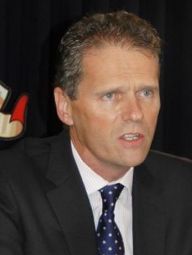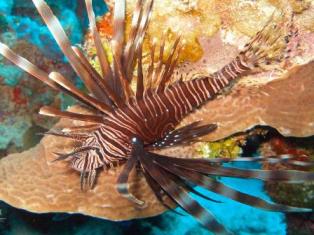Archive for April 11th, 2010

Cuts could improve efficiency says governor
 (CNS): The governor has said the decision by Cabinet to allow the civil service management to make the cost cutting decisions is not a cop out and that the administrative arm of government should look at the 2010/11 budget target as an opportunity to improve efficiency. Duncan Taylor said the scale of the cuts that have been made to personnel should mean there will be no enforced redundancies but that jobs will be lost through natural wastage. He confirmed it was a Cabinet decision to cut the budget and set a specific target for government to spend which has been left to the deputy governor and the civil service senior management to decide how best to achieve the cost cuts and make the service more efficient.
(CNS): The governor has said the decision by Cabinet to allow the civil service management to make the cost cutting decisions is not a cop out and that the administrative arm of government should look at the 2010/11 budget target as an opportunity to improve efficiency. Duncan Taylor said the scale of the cuts that have been made to personnel should mean there will be no enforced redundancies but that jobs will be lost through natural wastage. He confirmed it was a Cabinet decision to cut the budget and set a specific target for government to spend which has been left to the deputy governor and the civil service senior management to decide how best to achieve the cost cuts and make the service more efficient.
delivering services under the circumstances.

Department of Environment continues lionfish battle
 (CNS): The Department of Environment says there are now over 300 divers and snorkelers trained on the course developed by the Reef Environmental Education Foundation (REEF) and certified by the Marine Conservation Board to catch and remove lionfish from Cayman waters, and between them they have removed over a 1,000 fish. The battle to control these invasive and aggressive fish is a tough one but the DoE has said that, having begun to address the fish’s numbers early in Cayman waters, despite their widespread invasion of the wider Caribbean region, it is still possible to control the numbers in local waters. (Photo by Alex Henderson)
(CNS): The Department of Environment says there are now over 300 divers and snorkelers trained on the course developed by the Reef Environmental Education Foundation (REEF) and certified by the Marine Conservation Board to catch and remove lionfish from Cayman waters, and between them they have removed over a 1,000 fish. The battle to control these invasive and aggressive fish is a tough one but the DoE has said that, having begun to address the fish’s numbers early in Cayman waters, despite their widespread invasion of the wider Caribbean region, it is still possible to control the numbers in local waters. (Photo by Alex Henderson)

SPIT cops back with full time RCIPS contracts
 (CNS): Police have confirmed that a number of former UK police officers who have worked in Cayman before “in specialist roles” have been employed by the RCIPS but have not confirmed if Richard Oliver is the new head of the police anti-corruption unit. Oliver worked with the special police investigation team (SPIT) on the discredited Operation Tempura and the unresolved Operation Cealt and was involved with the prosecution of Deputy Commissioner Rudy Dixon. He reportedly also played a role in the case against Lyndon Martin. Both Dixon and Martin were found not guilty in trials last year. Dennis Walkington, another member of SPIT, is also understood to have been offered a permanent position within the RCIPS.
(CNS): Police have confirmed that a number of former UK police officers who have worked in Cayman before “in specialist roles” have been employed by the RCIPS but have not confirmed if Richard Oliver is the new head of the police anti-corruption unit. Oliver worked with the special police investigation team (SPIT) on the discredited Operation Tempura and the unresolved Operation Cealt and was involved with the prosecution of Deputy Commissioner Rudy Dixon. He reportedly also played a role in the case against Lyndon Martin. Both Dixon and Martin were found not guilty in trials last year. Dennis Walkington, another member of SPIT, is also understood to have been offered a permanent position within the RCIPS.
Operation Tempura began in the Cayman Islands when the former governor, Stuart Jack, announced the presence of Scotland Yard in Cayman in March 2008. The then police commissioner Stuart Kernohan, the deputy commissioner Rudolph Dixon and a chief superintendent John Jones were suspended from their jobs and places on required leave.
The investigation began as a result of suspicions by employees of Cayman Net News that their boss, Desmond Seales, was in a corrupt relationship with Deputy RCIPS Commissioner Anthony Ennis. SPIT said Ennis was exonerated early in their investigation but the UK cops continued to investigate what they said were both unrelated and related matters of potential corruption. The investigations resulted in the unlawful arrest of a local judge, the arrest of former police inspector Burman Scott, the sacking of Kernohan and failed prosecutions against Dixon and Lyndon Martin, a former Net News employee.
Jones was given his job back last year and cleared of suspicion but despite the not guilty verdict at his trial last year, Dixon remains on required leave on full pay. Both Kernohan and Scott have filed suits against the RCIPS and the SPIT officers claiming significant damages, which have yet to be settled.

Richard Dawkins: I will arrest Pope Benedict XVI

 (Times Online): Richard Dawkinds, the atheist campaigner, is planning a legal ambush to have the Pope arrested during his state visit to Britain “for crimes against humanity”. Dawkins and Christopher Hitchens, the atheist author, have asked human rights lawyers to produce a case for charging Pope Benedict XVI over his alleged cover-up of sexual abuse in the Catholic church. The pair believe they can exploit the same legal principle used to arrest Augusto Pinochet, the late Chilean dictator, when he visited Britain in 1998.
(Times Online): Richard Dawkinds, the atheist campaigner, is planning a legal ambush to have the Pope arrested during his state visit to Britain “for crimes against humanity”. Dawkins and Christopher Hitchens, the atheist author, have asked human rights lawyers to produce a case for charging Pope Benedict XVI over his alleged cover-up of sexual abuse in the Catholic church. The pair believe they can exploit the same legal principle used to arrest Augusto Pinochet, the late Chilean dictator, when he visited Britain in 1998.